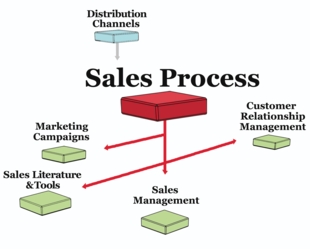Sales Process

How do prospects buy your product or service? Does a single decisionmaker find a product and buy on the spot, or does s/he go through many steps and approvals first? Perhaps there are multiple departments involved in the decision, each with its own needs?
A sales process is a defined series of steps you follow as you guide prospects from initial contact to purchase. It begins when you first identify a new prospect:
| STEP 1 | STEP 2 | STEP 3 | STEP 4 | STEP 5 |
|---|---|---|---|---|
| A prospect responds to a campaign & requests information | A sales rep calls the prospect to explain your product | In-person meeting & product demo | Your team submits a proposal | Prospect signs an agreement & makes first payment |
A documented sales process is a flowchart that explains
- Each distinct step a prospect takes
- Knowledge the prospect needs to move to the next step
- Literature & tools you can provide to help the prospect move forward
- Length of time a prospect needs at each step
- Conversion rates: the percentage of prospects who move from one step to the next
With a documented sales process, you have a powerful tool that enables you to
- Sell more efficiently
- Generate more accurate sales and revenue reports
- Estimate the revenue and return on investment (ROI) of your marketing campaigns
- See which stages take the most time and find ways to move prospects forward
- Create better literature and tools
- Improve your campaigns
- Minimize the amount of time your reps spend on estimates and forecasts
Do you see your company in one of these scenarios?
| Best Case | Neutral Case | Worst Case |
|---|---|---|
| You have a well-designed process that measures the number of prospects you have at each stage, how long they stay in each stage, and the revenue your entire pipeline represents. You deliver the right amount of information prospects need at each step, which helps them make decisions more quickly and move to the next stage.You use your sales process to create more successful marketing campaigns because you can predict how many leads will become customers and what those leads will be worth to your company. | You may or may not have a defined sales process. You generally follow the same steps to close a customer, but there’s a big variance in the amount of time it takes to close. In fact, even your strongest reps have trouble closing certain types of prospects. Your forecasts are probably all manual and generally accurate, but you wish you had a thorough snapshot to show exactly how many accounts are at a certain stage and what you need to do to close. | You don’t have a process or use one that doesn’t match how prospects want to buy.You deliver all of the information about your product but then seem to lose control of the prospect. Some prospects end up buying, but you don’t know why the others don’t.It’s a constant battle to figure out how many real prospects you have and what they’re worth. Your sales team often spends valuable time creating manual reports instead of selling, which further hurts your revenue. |
0 comments:
Post a Comment